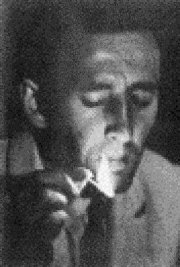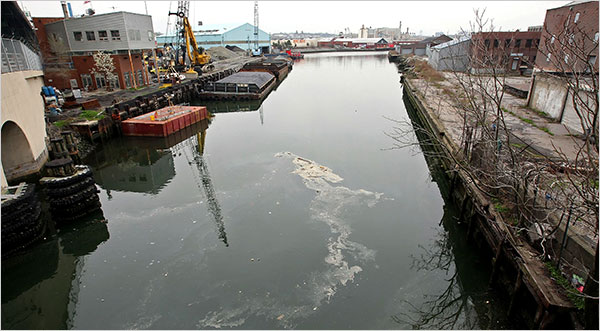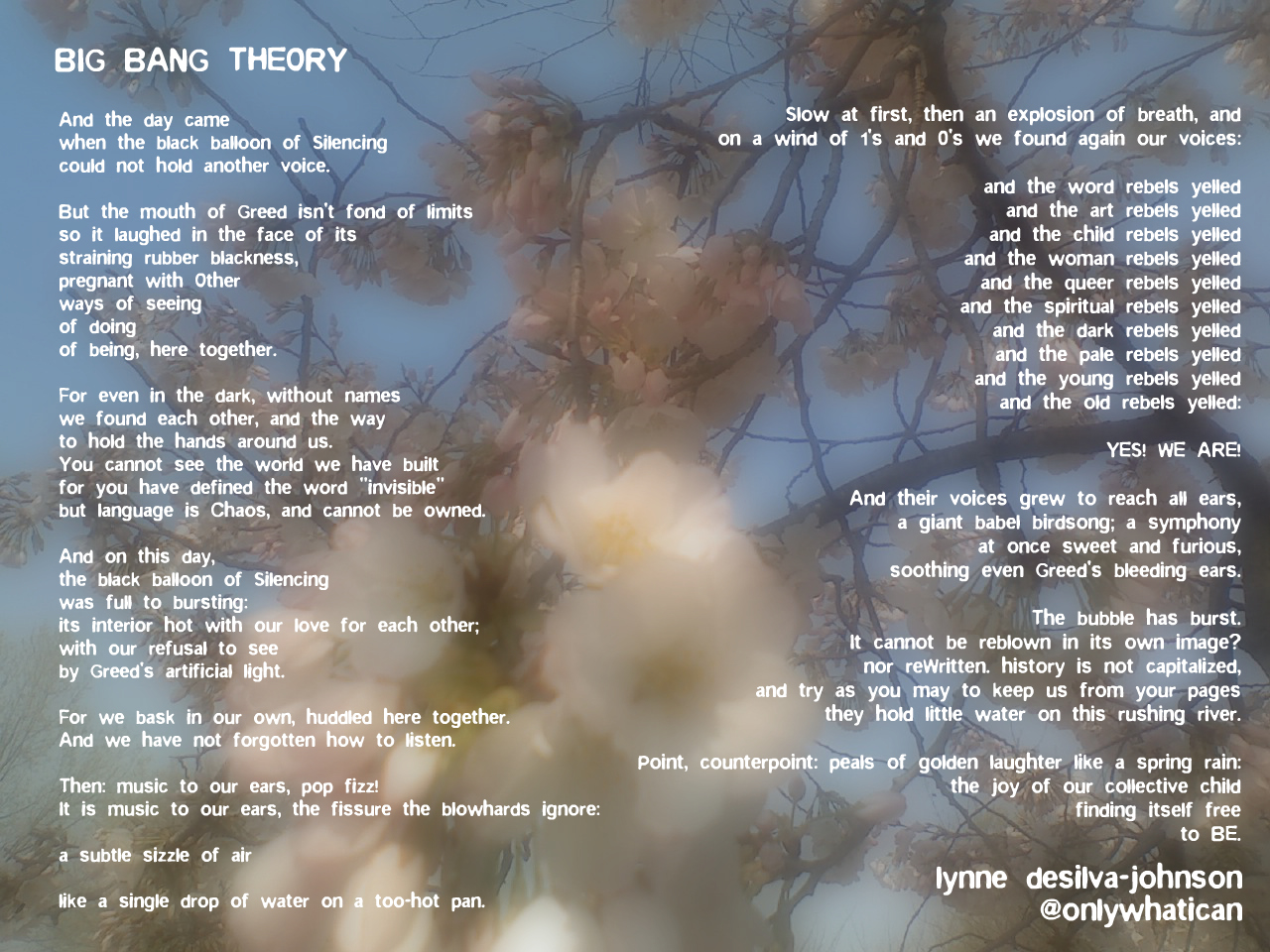POETRY MONTH 30/30/30 : Community, Inspiration, Tradition :: Day 8: Frank Ortega on Andrew Acciaro
[caption id="attachment_541" align="alignleft" width="142" caption="photo: Howard Goodman"] [/caption]
It's Easter. I don't have any chemically-colored eggs or chocolate that I can offer you here, no old zombie stories, just unnatural spring weather on a planet that has officially had 324 consecutive months of global temperatures exceeding their long-term average for any given month. You can convert that to years, if you're feeling brave. You can pray, if it helps. And you can read poetry.
It's Easter, and before you go searching for new eggs or reborn gods or just plain hope, let me share this living soul, a human deity, whose intelligence and compassion fill me with that hope we are constantly seeking. His name is Andrew Acciaro, and he lives and works near me in Peekskill, next to the Hudson River. Andrew lives and breathes the poetic life, and it is impossible for me to chose even one poem of his to share, as each goes in such different directions, as if Andrew is dipping into the consciousness of all styles, past, present and future to offer vital messages of the now.
[/caption]
It's Easter. I don't have any chemically-colored eggs or chocolate that I can offer you here, no old zombie stories, just unnatural spring weather on a planet that has officially had 324 consecutive months of global temperatures exceeding their long-term average for any given month. You can convert that to years, if you're feeling brave. You can pray, if it helps. And you can read poetry.
It's Easter, and before you go searching for new eggs or reborn gods or just plain hope, let me share this living soul, a human deity, whose intelligence and compassion fill me with that hope we are constantly seeking. His name is Andrew Acciaro, and he lives and works near me in Peekskill, next to the Hudson River. Andrew lives and breathes the poetic life, and it is impossible for me to chose even one poem of his to share, as each goes in such different directions, as if Andrew is dipping into the consciousness of all styles, past, present and future to offer vital messages of the now.
Poem: What Great Troubleshot Fauna We've Become by Peter Milne Greiner
I boycott his atoms / after a glissade of bunk attempts / then laud their inky, mobile / residuum again. / The ingredients of / the music are my mimic falsetto / and the sound of a door locking /
POETRY MONTH 30/30/30: Inspiration, Community, Tradition :: DAY 7: Gregory Crosby on Kenneth Fearing
 When I moved to New York nearly eight years ago, I became a determined flâneur—in Baudelaire’s formulation, one who walks the city in order to experience it—and although the New York I walked was not 1929 or 1938 or 1943, I heard everywhere, persistent, sardonic, and expansive, the voice of Kenneth Fearing (1902-1961) in the back of my mind. To read Fearing is to suddenly meet Walt Whitman not in a supermarket but in the neon shadows of a film noir. I can think of few other poets who capture the alienation and exultation of urban existence, at once cosmopolitan and proletariat, sophisticated and vulgar. To live in a city is to live at all times inside the human mind: Fearing’s best poems buzz in that hive of loneliness and longing:
X Minus X
Even when your friend, the radio, is still; even when her dream, the magazine, is finished; even when his life, the ticker, is silent; even when their destiny, the boulevard, is bare;
And after that paradise, the dance-hall, is closed; after that theater, the clinic, is dark,
Still there will be your desire, and hers, and his hopes and theirs,
Your laughter, their laughter,
Your curse and his curse, her reward and their reward, their dismay and his dismay and her dismay and yours—
Even when your enemy, the collector, is dead; even when your counselor, the salesman, is sleeping; even when your sweetheart, the movie queen, has spoken; even when your friend, the magnate, is gone.
When I moved to New York nearly eight years ago, I became a determined flâneur—in Baudelaire’s formulation, one who walks the city in order to experience it—and although the New York I walked was not 1929 or 1938 or 1943, I heard everywhere, persistent, sardonic, and expansive, the voice of Kenneth Fearing (1902-1961) in the back of my mind. To read Fearing is to suddenly meet Walt Whitman not in a supermarket but in the neon shadows of a film noir. I can think of few other poets who capture the alienation and exultation of urban existence, at once cosmopolitan and proletariat, sophisticated and vulgar. To live in a city is to live at all times inside the human mind: Fearing’s best poems buzz in that hive of loneliness and longing:
X Minus X
Even when your friend, the radio, is still; even when her dream, the magazine, is finished; even when his life, the ticker, is silent; even when their destiny, the boulevard, is bare;
And after that paradise, the dance-hall, is closed; after that theater, the clinic, is dark,
Still there will be your desire, and hers, and his hopes and theirs,
Your laughter, their laughter,
Your curse and his curse, her reward and their reward, their dismay and his dismay and her dismay and yours—
Even when your enemy, the collector, is dead; even when your counselor, the salesman, is sleeping; even when your sweetheart, the movie queen, has spoken; even when your friend, the magnate, is gone.
POETRY MONTH 30/30/30: Day 6 :: Matthew Nelson and Jacob Perkins on Paul Legault
Interview with the Self by Jacob Perkins & Matt Nelson Q: In what way has Paul Legault improved your sex life? A: It’s a tough question. We’d like to point out that we didn’t get into sir Legault on our own. Like any good relationship it takes, at the very least, two. Our friend read from his book in the subway and all she had to say was, “This guy will turn you inside out,” which he of course didn’t. No one can do that to you and if they try, you should call the proper MTA authorities. But he did turn us outside in, as in what the ufkc? His poems trick you into thinking you’re reading multiple voices shouting in a space where shouts can echo, colliding with each other and creating new sounds. But the intellectual gift is that all the voices are thrown. There is only one Wizard in this Oz. Legault takes control of your equilibrium and maintains a kind of trustless navigation that is impossible to follow on first read. Q: What method of Paul Legault’s language turns you on and why? A: Well, if you are one of those who can pick out patterns, Mr. Legault, at least in The Other Poems, which, by the way is titled on the sub-title tacked to most collections of poetry, sticks pretty close to what we would describe as a format. In our own work the format relies on a series of folds (literal) which we attack as a unit, one space at a time, passing our work back and forth without verbal cooperation. This results in a timing based on mutual challenge and uncomfortability. It is unpredictable but refreshing, the rhythm. Paul (can we call him Paul?) discomforts the supposition that what you read before was what was you read before. Every line, every word is a question game. When did the adjective turn into a noun? How can time be turned into space with just the tiniest turn of a preposition? These are the types of strange knife twists Paul manipulates causing a poetry hemorrhage, showing you the insides of words.
POETRY MONTH 30/30/30: Inspiration, Community, Tradition: Day 4 :: Tishon Woolcock on Orhan Veli Kanik
 I’m going to level with you; I know nothing about Turkey and I know even less about Turkish Poetry. Luckily, I have Buké, my sole Turkish friend. Buké is tiny, smokes cigarettes, and speaks with a directness that can sometimes be mistaken for rudeness. It is she who introduced me to the Turkish poet Orhan Veli Kanik (1914-1950). I can’t speak to Kanik’s stature but, like Buké, his poetry is about as direct as a poet can get. Like the work of William Carlos Williams or, more contemporarily, Billy Collins, Kanik’s poems have been described as the kind of poetry that convinces readers they, too, can write a poem. Take, for example, “The Hill”.
I’m going to level with you; I know nothing about Turkey and I know even less about Turkish Poetry. Luckily, I have Buké, my sole Turkish friend. Buké is tiny, smokes cigarettes, and speaks with a directness that can sometimes be mistaken for rudeness. It is she who introduced me to the Turkish poet Orhan Veli Kanik (1914-1950). I can’t speak to Kanik’s stature but, like Buké, his poetry is about as direct as a poet can get. Like the work of William Carlos Williams or, more contemporarily, Billy Collins, Kanik’s poems have been described as the kind of poetry that convinces readers they, too, can write a poem. Take, for example, “The Hill”.THE HILL
Poetry Month 30/30/30: Inspiration, Community, Tradition: DAY 3 :: Bill Considine on Elinor Nauen
POETRY MONTH 30/30/30: Inspiration, Community, Tradition :: Overview and DAY 1: Lynne DeSilva-Johnson on Mina/Traver Pam Dick
 Mina/Traver Pam Dick (commence drooling) is, per her boiler-bio-plate, "a writer, artist and philosopher living in New York City. She's a native New Yorker. She received a BA from Yale and an MFA in Painting as well as an MA in Philosophy from the University of Minnesota. Her writing has appeared inTantalum, BOMB and The Brooklyn Rail, and is forthcoming in The Portable Boog Reader 4 and Aufgabe#9; her philosophical work has appeared in a collection published by the International Wittgenstein Symposium (Kirchberg am Wechsel, Austria)."
Reviews of her first book, Delinquent, are smattered with praise like this apropos nugget: "Like a gender-errant Benjamin, Mina Pam Dick constellates recombinant philosophies, aesthetic forgeries, and the intertextual detritus of the big slithering city. The poems and prose that pack Delinquent’s sucker punch are weighted with the freight of excess baggage, which means they are the very work of today" (—Vanessa Place)
Mina/Traver Pam Dick (commence drooling) is, per her boiler-bio-plate, "a writer, artist and philosopher living in New York City. She's a native New Yorker. She received a BA from Yale and an MFA in Painting as well as an MA in Philosophy from the University of Minnesota. Her writing has appeared inTantalum, BOMB and The Brooklyn Rail, and is forthcoming in The Portable Boog Reader 4 and Aufgabe#9; her philosophical work has appeared in a collection published by the International Wittgenstein Symposium (Kirchberg am Wechsel, Austria)."
Reviews of her first book, Delinquent, are smattered with praise like this apropos nugget: "Like a gender-errant Benjamin, Mina Pam Dick constellates recombinant philosophies, aesthetic forgeries, and the intertextual detritus of the big slithering city. The poems and prose that pack Delinquent’s sucker punch are weighted with the freight of excess baggage, which means they are the very work of today" (—Vanessa Place)Community CoCo: GOWANUS: Poetry, Audio Production: Bill Considine, Cosmo D, Ambrose Bye
Gowanus (Yellow Shoes): Bill Considine, Poetry - Cosmo D, Music - Produced/Mixed by Ambrose Bye from New Festivals of Rhizomes and Wraiths
A Beautiful Marsupial Afternoon: CA Conrad, Animation by Luca Dipierro
Exit Strata is very pleased to preview for you the darkly whimsical, wonderful animation Luca Dipierro made in collaboration with Philadelphia's friend to poets everywhere, CA Conrad, in celebration of Conrad's new book, A Beautiful Marsupial Afternoon, forthcoming from Wave. Music
Big Bang Theory / Open Call for Multimedia and hybrid/digital/cross genre work
Below you can see the visual I created for my piece, Big Bang Theory. If you create hybrid pieces like this, or have ever been inspired to, we would love to showcase these inter-media-ry explorations either here or in our







